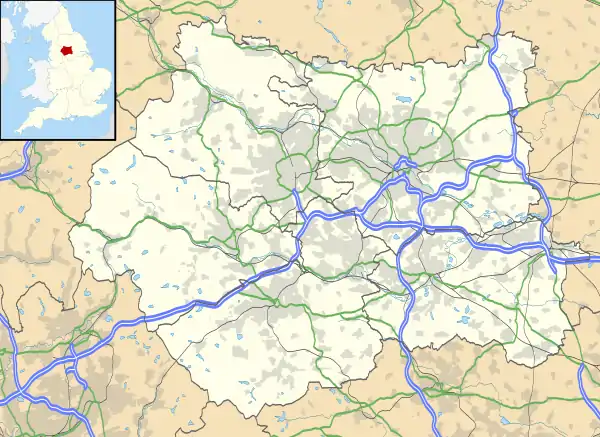Farfield Friends Meeting House
Farfield Friends Meeting House is a Quaker meeting house no longer regularly in use by a Quaker meeting and now owned by the Historic Chapels Trust. It is located some 2 miles (3 km) north of the village of Addingham, West Yorkshire, England. It is recorded in the National Heritage List for England as a designated Grade II* listed building..[1]
| Farfield Friends Meeting House | |
|---|---|
%252C_Addingham_-_geograph.org.uk_-_675716.jpg.webp) Farfield Friends Meeting House | |
| Location | Near Addingham, West Yorkshire, England |
| Coordinates | 53.9621°N 1.8855°W |
| OS grid reference | SE 076 518 |
| Built | 1689 |
| Built for | Quakers |
| Governing body | Historic Chapels Trust |
Listed Building – Grade II* | |
| Designated | 25 January 1985 |
| Reference no. | 1199556 |
 Location in West Yorkshire | |
History
In 1686, Anthony Myers provided a plot of land to be used as a Quaker burial ground. Three years later, in 1689, the Act of Toleration was passed giving the right to Nonconformists to build places of worship. In that year Anthony Myers gave a further adjacent plot of land for building a meeting house; the construction of this was completed during the same year.[1][2]
Architecture and furnishings
The small meeting house is typical of rural Quaker meeting houses of the period, poignant in its simplicity. It is constructed in stone rubble with ashlar dressings and has a stone slate roof. The building is in a single storey with three bays. There is one door, and the three windows have mullions; at the corners of the building are quoins. The interior consists of a single cell. At its east end is a dais with settles and turned balusters.[1]
External features
%252C_Addingham_-_geograph.org.uk_-_675649.jpg.webp)
In the graveyard to the northeast of the meeting house are five joined chest tombs to the Myers family dated between 1687 and 1737. They are designated as a Grade II listed building.[3] This style of tomb is unusual in Quaker burial grounds as it was considered to be ostentatious and was later discouraged by the movement.[2]
Present day
The building is today owned by the Historic Chapels Trust who have restored it and aim to preserve it in perpetuity, as part of the physical evidence of British religious life. It can be visited during daylight hours. Three car parking spaces and picnic area are adjacent. A long-distance footpath, the Dales Way, passes through the grounds.[2]
References
- Historic England, "Friends Meeting House, Addingham (1199556)", National Heritage List for England, retrieved 14 May 2011
- Farfield Friends Meeting House, Historic Chapels Trust, retrieved 29 June 2010
- Historic England, "Five attached chest tombs to the Myers family 30 metres to the northeast of the Friends Meeting House, Addingham (1314231)", National Heritage List for England, retrieved 14 May 2011